
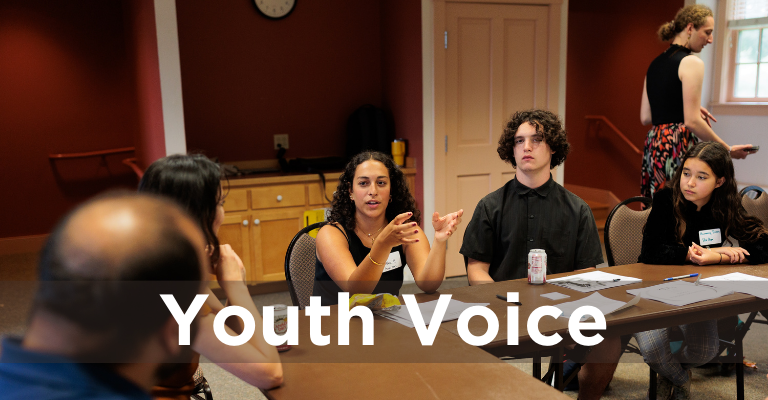
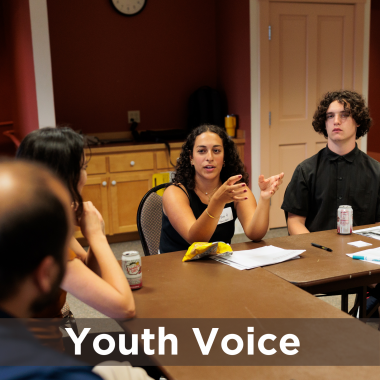

Since 2017, we have led statewide discussions on the importance of youth voice, advocating for youth to be included in policy discussions, helping local communities and organizations to establish their own local youth councils and convening State Youth Advisory Groups to work on issues such as Youth Rights and Health Equity.
It was the work of the 2020 State Youth Advisory Group that informed the writing of H.293, a Vermont State Legislature bill signed into law by Governor Scott, which established the State Youth Council—a diverse group of 28 Vermont youth from each county responsible for advising the Governor and General Assembly on the policies that impact young persons today.
The State Youth Council guarantees that this oft-disenfranchised population of dynamic and innovative individuals will have the opportunity to directly participate in Vermont’s democracy, effect the change they wish to see, and be empowered to guide the state’s future.
Vermont’s Youth Services Advisory Council selected members of the first State Youth Council in the fall of 2022 from a pool of 200 applicants. The State Youth Council held its inaugural meeting December 13, 2022 in Montpelier.
We look forward to seeing the positive impact Vermont’s State Youth Council will have on generations of Vermonters to come!
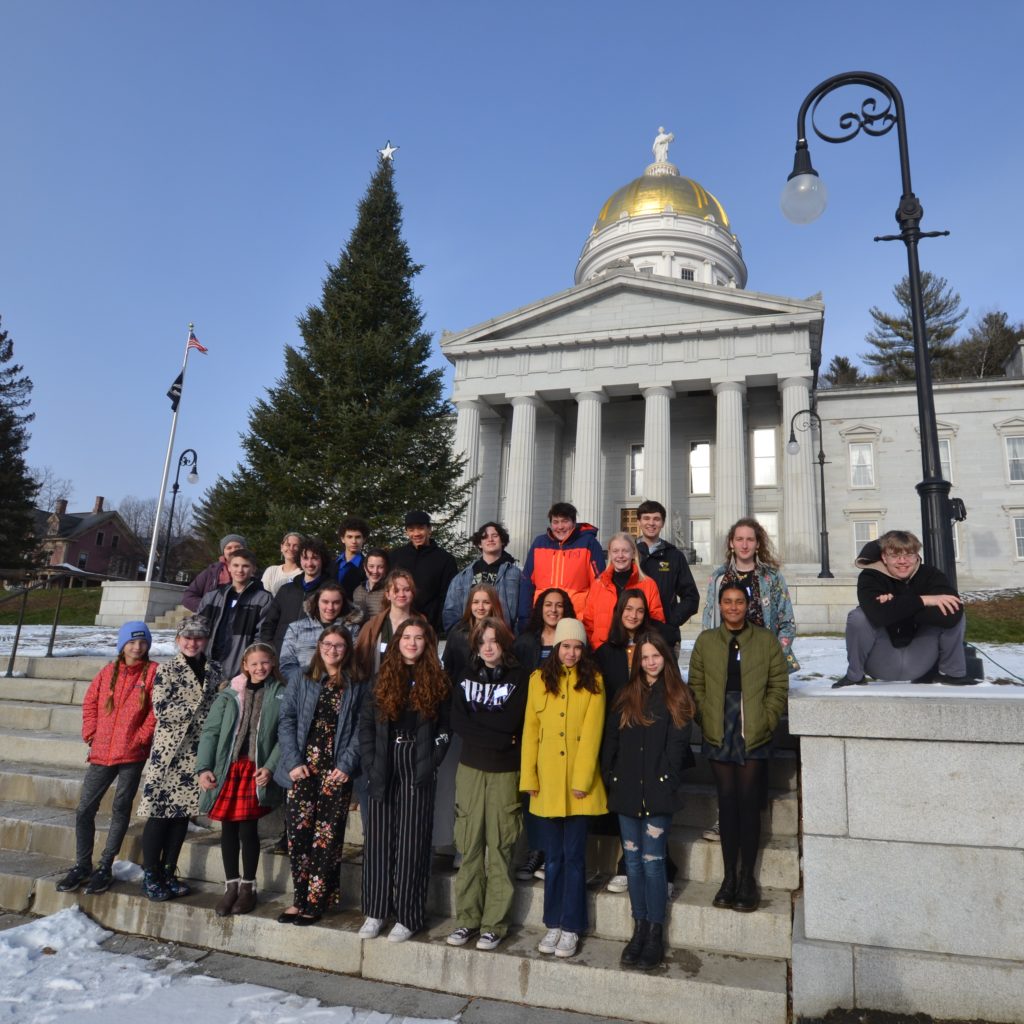
Since 2020, Vermont Afterschool has been convening State Youth Advisory Groups to provide input on important policy matters concerning Vermont’s young people. In 2020, close to 50 young people came together via the internet to work throughout the summer and, despite the pandemic, develop recommendations for the State Youth Council. SYAG members helped draft the recommendations, testified in support of it before the Vermont House and Senate Committees on Government Operations, and celebrated when Governor Scott signed the legislation into law.
In 2021, a second State Youth Advisory Group was formed to grapple with issues of health equity. In partnership with VT Rays and VCHIP, the group looked at the intersectionality of access to afterschool programs, access to primary health care, and access to mental health supports. Their findings and recommendations are being shared with decision-makers and health practitioners through avenues such as Grand Rounds at the UVM Medical Center.
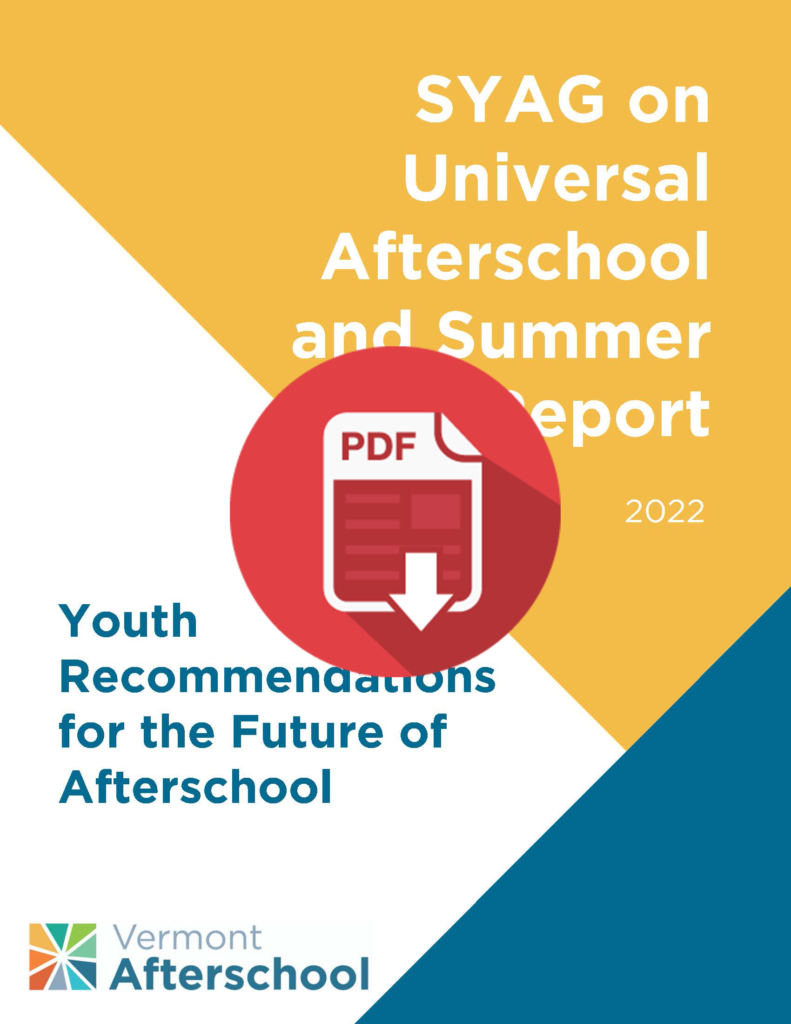
Now, in 2022, a third round of young people have come together as a State Youth Advisory Group to work in partnership with the governor’s office and the Interagency Afterschool Youth Task Force on the creation of universal afterschool and summer in Vermont. In May 2022, the SYAG released the 2022 Universal Afterschool and Summer Report, which contained youth recommendations for the future of afterschool in Vermont.
The 2022 group feels strongly about seeing youth voice and leadership at every level and have kicked off a Youth Stories Initiative to collect input and ideas from young people across the state. Stay tuned for more stories and recommendations to come from this group!
In addition to its statewide work, Vermont Afterschool is committed to supporting local youth councils across the state.
Our approach to youth councils is not about creating an elite group of youth who are charged with making all the decisions. Nor do we expect any discrete group of youth to be able to represent the viewpoints of all the youth in their community. Instead, we work with communities and local organizations to build youth councils with a central focus on elevating the voices of as many youth as possible at every stage of the process. Our youth council members are amplifiers of youth voice; not token or elite youth who try to speak on behalf of all other youth.
Currently, Vermont Afterschool is supporting local youth councils in 8-10 communities across the state. With support from the Northfield Savings Bank Foundation and the Vermont Department of Health, we provide grant funding that allows for stipends for participating youth and funds to support youth-driven projects. Vermont Afterschool guides the local youth councils through a participatory budgeting process that gives youth the opportunity to submit project proposals that address community needs and allows local youth to vote on the projects they want to see implemented. The winning projects will be funded from youth to youth!
To learn more about how we use participatory budgeting process with the youth councils, watch the video below.
Interested in help with starting your own youth council? Please get in touch with us at info@vermontafterschool.org. Hope to hear from you and the young people in your program or community soon!
Every decision made–whether by policymakers, businesses, local government, school boards, or other organizations–has the potential to impact youth. Young people deserve to have the chance to shape their community and fight for the future they want. That is why here at Vermont Afterschool, we believe youth voice and youth empowerment are essential. Advocacy has the power to uplift youth voices and engage youth in matters important to them. It also allows young people the opportunity to feel heard and to make change in their community, state, or country.
Click here for more information on what advocacy is and the different actions it can entail.
There are many ways youth can get involved in advocacy. Find out if there are any youth councils, clubs, or groups in your community that are involved in advocacy efforts. For example, a club that focuses around climate change and advocates for possible initiatives to be implemented in Vermont. Or an anti-Racism group that advocates for anti-racist policies and practices in your community. Another idea would be researching non-profits or organizations that do work in the area you are interested in. These places may have opportunities for you to get involved in advocacy work.
Additionally, you can start advocacy work all on your own! For instance, you can create a blog, write an op-ed or letter to the editor for a local newspaper, or start a social media campaign to advocate for your issue. Writing an article that details why your issue is important and the change you would like to see can send a powerful message to governments and organizations (here’s a great example). Another way to use your voice is to attend a community meeting to share your position on the issue at hand or submit comments via email.
If you aren’t sure where to start with your advocacy consider these initial steps. First, think about the topics you are passionate about and the changes you want to see made. Second, you have to consider scale. Is this change something you want to see in your community? Or is it statewide or national? Next, think about the institutions and organizations that influence or make the decisions on your chosen topic. Reach out to them and see if there is any way to get involved.
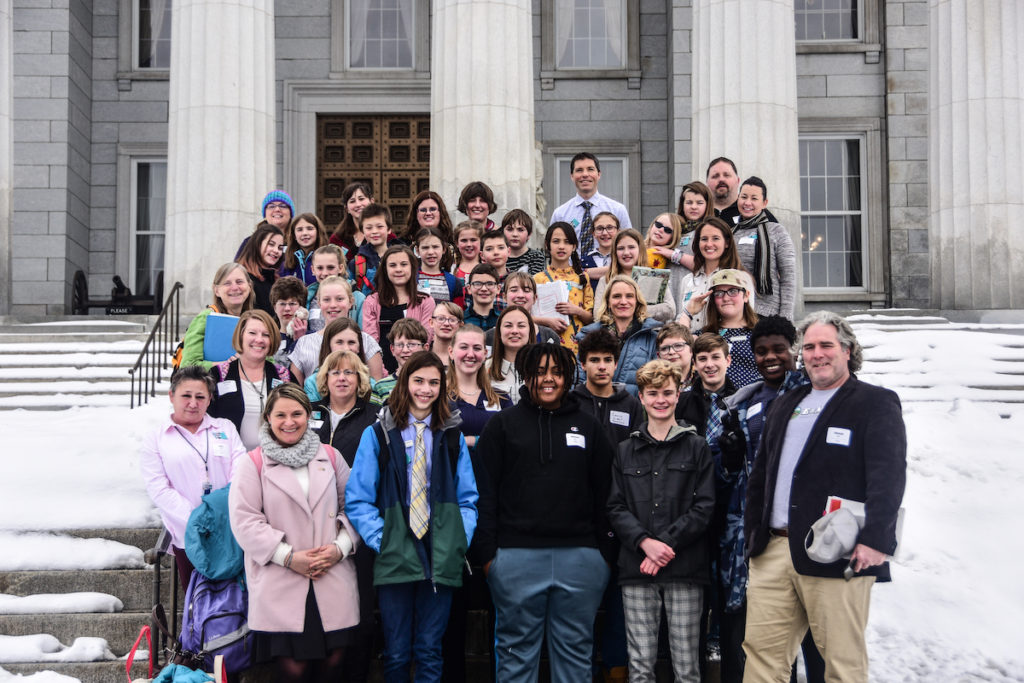
Getting youth involved in advocacy is a great way to promote empowerment and encourage them to get engaged in issues they care about. One way to get your youth involved in advocacy is to create a youth council in your community. A youth council gives youth the opportunity to advocate for projects and initiatives that help shape their community. This can increase youth engagement and make youth feel a greater sense of connection with the community. A group or club could also be created to help advocate for issues your youth are passionate about. This group could help educate the community, organize events, and research the topic. Another idea is to have your youth submit letters to the editors or op-eds to local newspapers.
Once you have a group of youth ready to advocate for change, you all can meet to organize an action plan. It can be very helpful to come up with a strategy for advocacy and to consider how to campaign for your issue.
In addition, you can research local nonprofits to see if they have any advocacy needs and how they would suggest you advocate for their cause. If there are already groups and clubs in your community that focus on advocating for the issues your youth are interested in, get your youth in touch with them to see if they can join. This way they will already be involved in a group doing the work and jump right into advocating for their cause.
Afterschool Alliance: Youth voice is key to advocacy success
School-Based Health Alliance: Recruiting and retaining young leaders
Voices of Youth: Guidelines on Adolescent Participation and Civic Engagement
Forum for Youth Investment: Building Effective Youth Councils: A practical guide to engaging youth in policy making
Advocates for Youth: Building Effective Youth-Adult Partnerships
Change My Community: Toolbox for Young Leaders
Advocates for Youth: Youth Activist Toolkit
ADL: 10 Ways Youth Can Engage in Activism
Youth Lead: Advocacy Starter Kit
Youth Lead: Youth in Civic Engagement Starter Kit
Youth Lead: Youth Engagement and Empowerment Starter Kit
Voices of Youth: Blogging 101
Voices of Youth: Youth Advocacy Guide Workbook
Voices of Youth: Youth Advocacy
Action Circles: Key tips for communicating with legislators
The Borgen Project: How to be an Advocate
School-based Health Alliance: Youth Engagement Toolkit